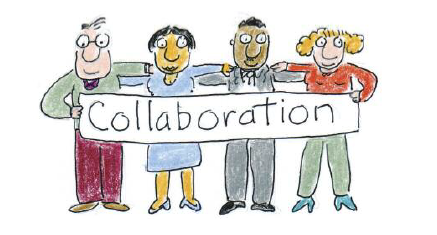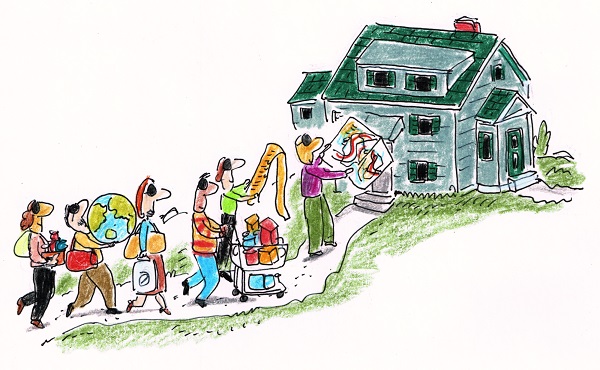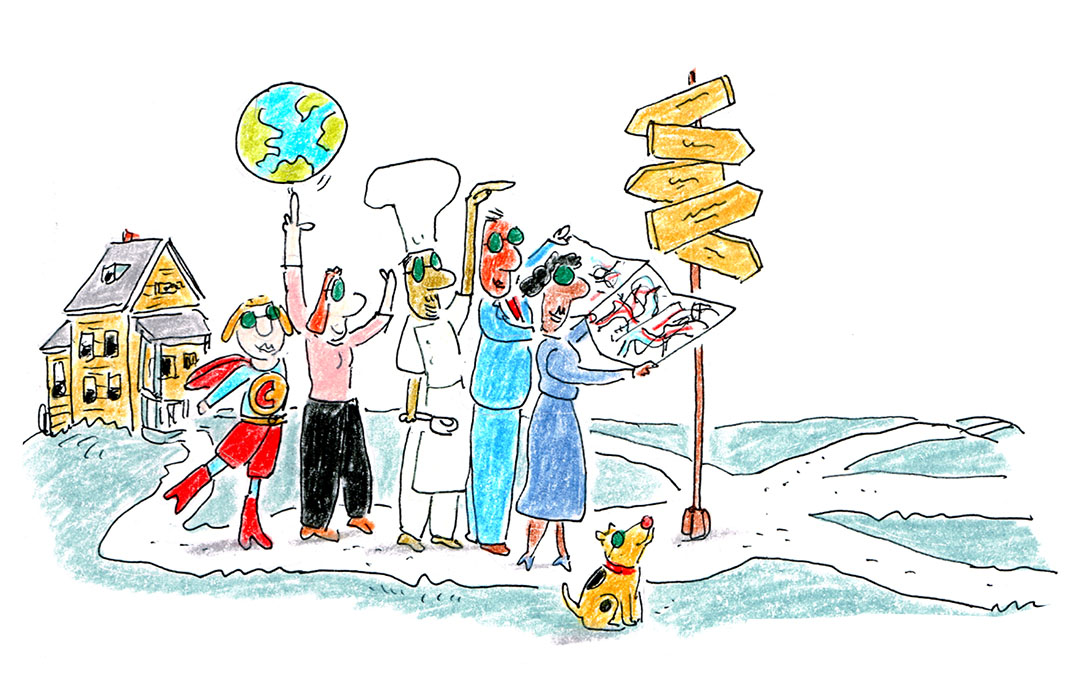Welcome Topic Leader!
 Leading a Topic Meeting is an opportunity to directly serve your neighbors and build collaborative muscle on your block. Your block leader will support you in your community. Enjoy the opportunity!
Leading a Topic Meeting is an opportunity to directly serve your neighbors and build collaborative muscle on your block. Your block leader will support you in your community. Enjoy the opportunity!
Meetings involve reporting on results from previous topics, discussing and evolving action plans for the current topic, and previewing the next topic. You will also highlight relevant local resources to deepen knowledge of that topic. Your team will review its performance and provide assistance to anyone who needs help using the Cool Block website.
About this Topic
The Energy Resilient Home Meeting
 With this topic, you will learn how to make your home “undisruptible” by developing energy backup systems and contingency plans.
With this topic, you will learn how to make your home “undisruptible” by developing energy backup systems and contingency plans.
It will help you deal with power outages by taking actions specifically tailored to your own wishes and needs. You’ll probably be amazed to discover that you can become flexible enough to handle just about any emergency that is likely to come along.
You may also be pleasantly surprised to discover that, in addition to improving your personal security, these preparedness actions contain the hidden bonus of enhancing your overall quality of life. As you deepen your connection with your neighbors and help one another prepare, you may discover a world of possibilities that has been hiding in plain sight.
Pre-Meeting Preparation
Click on each item to open for more detail...
1. Refreshments
Unless your team has decided to have a potluck dinner, it is important to serve light refreshments fifteen minutes before the meeting begins. This decision will have been made in the team-building meeting.
2. Room Setup
Arrange the room in a U shape. This allows people to see one another and you as the facilitator. This increases the quality of the sharing and community building. It can also be very helpful to write the meeting agenda on a piece of poster board, and display for all to see.
3. Timing
Tell the group at the start of the meeting what time you propose to end, and check that everyone can stay until the end. Make sure you end on time. Each element in the meeting agenda has an approximate time associated with it. It is rare that any meeting element will go for exactly that amount of time, so use it as a guideline. If one meeting element runs longer, you will need to make up the time by shortening another. Give the team shared responsibility for timekeeping. If any point seems likely to take a lot longer than you planned, tell the team and ask them to decide whether to extend the meeting or hurry to finish the point.
4. Inspirational Start
Open the meeting with something inspirational. Take the time to plan this well, as it motivates people to give their best effort. Find ideas for this inside the meeting script.
5. Prepare to Showcase Local Resources
Prepare to highlight up to two actions from this topic which are important to your community and, where available, for which there are local resources listed with the action.
See your city's MEMBERS ONLY section for recommendations on actions and local resources to showcase. Showcase in one of these ways:
- Share materials (e.g. handouts, guides) and/or show a video provided by a local resource's website
- Host a speaker if one is recommended by your city (note that this may add a bit of time to your agenda)
- Simply describe the action based on information found in your Action Plan along with any local resources available for that action.
6. Send a Meeting Preparation Message to the team
Contact your team members (via email or your team's preferred contact mechanism) 2-3 days before the meeting, to remind them of the place and time of the meeting. Ask them also to take the following steps in preparation [cut-and-paste the following into your message]:
"To prepare, please take these steps before the meeting:
- Review How to Use the Action Plan demonstration video (this link is also on the “Video and Tips” page for Topic 1).
- Review the Topic 1 actions and select those you have previously taken or are planning to take.
- Bring this Action Plan with you to our meeting to share and discuss."
7. Prepare to share your Action Plan
Like everyone else, come prepared to share your action plan for this topic.
8. Practice
- To get the full value from this script, take time to study it so you are fluent and understand what you are trying to achieve with each meeting element.
- Note any comments after each section to help you understand its purpose and any subtleties.
- Feel free to say things in your own words so that it feels natural.
- Review these Best Practices for Topic Meetings to help you be ready for anything that might happen.
Energy Resilient Home Meeting Script - approx. 90 minutes
Click on each item to open for more detail...
[University program only]
Take the PLAN agenda steps one week, and the REPORT agenda steps the next.
PLAN – Agenda steps
Open each of the agenda steps indicated, skipping the others.
- (Before you begin - catch up with each other for 15 minutes)
- Step 1
- Step 2 (if no local resources listed, discuss possible ones together)
- Step 3
- Step 7 (first two bullets)
- (At the end of your meeting - record Team members’ thoughts and highlights into Part Two of your Journey Log.)
REPORT– AGENDA steps
Open each of the agenda steps indicated, skipping the others.
- (Before you begin - catch up with each other for 15 minutes)
- Step 1
- Add: Share Actions Taken for 20 minutes
(What actions did you take? What did you learn? What support, if any, do you wish from the team? Did you enter the requested information in the "Report Results" section for each action taken?) - Step 4 - (second bullet on hazards)
- Step 7 – (last bullet)
- Step 8
- (At the end of your meeting - record Team members’ thoughts and highlights into Part Two of your Journey Log.)
Recruit a note-taker
- Ask for someone on the team to take a few notes on the interesting findings and outcomes of the meeting.
- You or your Block Leader can then include these in your email communications with the team.
1. Inspirational Start - 5 minutes
Ideas for your inspirational start:
- Start with a brief poem, quote, personal anecdote, short video, or something that connects the group to the meaning and larger purpose of what you are doing. Find example inspirational material used by other Cool Block leaders.
- Read your team purpose statement out loud to remind your neighbors of your collective vision for the block.
- Ask a "Get to Know" question, which will help your team members connect more deeply.
- If you are meeting over zoom, ask each person to serve a beverage and/or snack/treat for themselves, and tell the team what they have served themselves and why. This will help get everyone relaxed and talking.
2. Showcase Local Resources - 15 minutes
Highlight up to two actions from this topic which are important to your community and, where available, for which there are local resources listed with the action.
Check your city's MEMBERS ONLY section for any recommendations on actions and local resources to showcase. Showcase in one of these ways:
- Share materials (e.g. handouts, guides) and/or show a video provided by a local resource's website
- Host a speaker if one is recommended by your city (note that this may add a bit of time to your agenda)
- Simply describe the action based on information found in your Action Plan along with any local resources available for that action.
3. Share Action Plans - 20 minutes
- Watch the introductory video for Topic 1 together e.g. on your TV monitor or someone's computer.
- (Check also your city's MEMBERS ONLY section to see if there is a locally created video for this topic.)
- Go around the room and ask each household to share the actions they selected to take, and why. Team members should feel free to modify their plans based on what they have heard at the meeting.
- Ask teammates to request support for carrying out any action they find challenging, for example, technical assistance, advice, or information. Encourage team members to offer support where they feel competent.
- Invite team members to share any collaborative actions they wish to lead.
- Take a moment now for everyone to update their Action Plan with their selected actions. You can do it right on your phones and help anyone who needs a hand.
4. Prepare Team for the Next Topic - 10 minutes
- Read aloud the actions in the next topic, Disaster-Resilient Household, to familiarize the team with the content.
- Take a few minutes to review the local hazards you uniquely face. Is your block subject to flood? earthquake? wildfire? If so, you will want to take note of any actions and local resources that will help you prepare for these hazards.
NOTE: Check your city's MEMBERS ONLY section for possible information on local hazards.
- Let the team know that, along with taking and reporting on the actions they committed to in this meeting, they need to bring their Disaster-Resilient Household action plan to the next meeting.
5. Check in on Team Performance - 10 minutes
NOTE: This is a step that the Block Leader will always lead.
Take time to look at how the team is functioning and tune up as needed. A team that is committed to mutual accountability and peer-support achieves the best results. The objective here is to encourage, not to blame or shame. Every need for support is an opportunity for team members to connect in meaningful ways, building collaboration muscle along the way.
- Does anyone need help getting registered or using the website?
- If anyone did not come with their action plan, ask what happened and if they need any support in carrying it out. If they just did not get around to doing it, kindly ask if they will be able to bring it to the next meeting.
- If any team members came late, request that they come on time in the future so the meeting can be run without interruptions. If a number of people came late, requiring you to delay the start of the meeting, request that they come on time so you can end on time. If people can’t get there at the agreed-on time, ask if people would like to start the meeting later.
- If any household did not attend, check in after the meeting to confirm that they are still committed to participating in the program. If so, request they prioritize attending the following meetings, brief them on what happened at this meeting, and ask about their household's action plan.
6. Set Up Support - 5 minutes
NOTE: This is also a step that the Block Leader or co-Leader will lead.
Left on our own, motivation often wanes. Support outreach makes a big difference in assisting team members to stay on track.
- Review who may need assistance using the Cool Block action planning tools on the website; ask someone to stay to help them until their data entry is complete, or arrange offline assistance.
- Ask if anyone anticipates needing support with taking action in the coming days; if so, see who can assist them.
- Plan to check in individually with anyone else you believe may need assistance.
- Say that you will send a friendly check-in message to the group to see how people are doing, around the mid-point between meetings. Encourage people to ask questions via the group communication channel.
7. Review Next Steps - 5 minutes
Review the next steps with everyone on the team. They are:
- Take the actions you planned for this topic.
- For each action taken, click on "Report Results" and enter the requested information. Note that some of the actions in this topic may take more than two weeks to complete. Once they are underway and you have a plan to complete them, you may mark them done. Be ready to report on what you did in the next meeting (you can review your results from your smartphone.)
- Read over the next topic’s actions, Disaster-Resilient Household, and make an action plan. Bring this action plan to the next meeting (you can view it from your smartphone.) Bring also any support requests you have.
8. Acknowledge Team's Accomplishments - 5 minutes
- Express your appreciation to team members for what they have accomplished. State in a sentence or two what was most meaningful for you, and invite others to do the same. If appropriate, end with some type of celebration.

